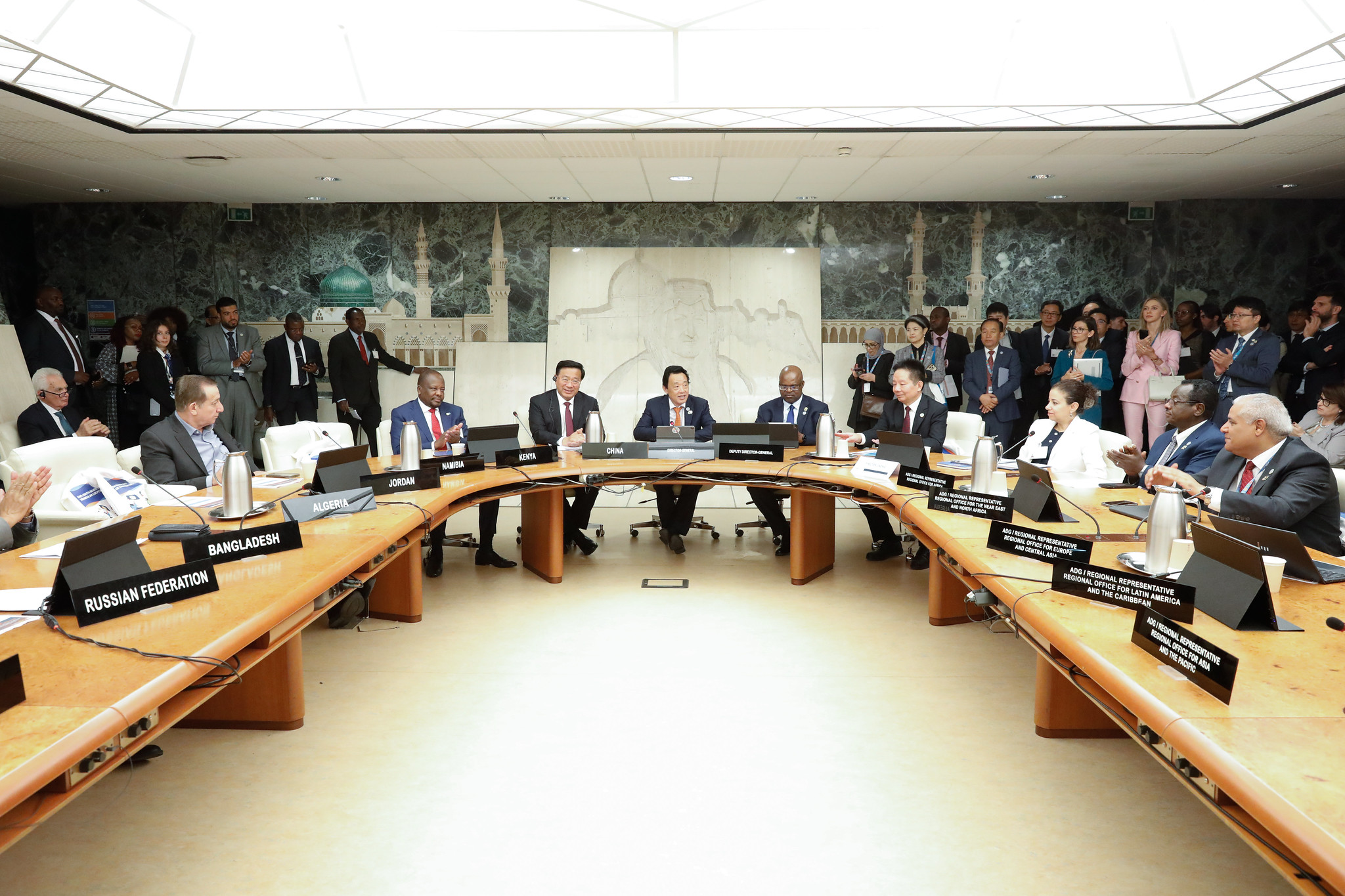WFF 2025: South-South and Triangular Cooperation powers agrifood system transformation
Ministerial Dialogue at FAO focuses on way forward based on four decades of shared experiences

South–South and Triangular Cooperation event brought together ministers, development partners, and stakeholders from 18 countries.
©FAO/Giorgio Cosulich de Pecine
Rome – As part of its 80th anniversary commemorations, the Food and Agriculture Organization of the United Nations (FAO) convened a high-level event today at its headquarters in Rome, reaffirming its commitment to South–South and Triangular Cooperation (SSTC) as a catalyst for sustainable agrifood system transformation.
The event, titled “South–South and Triangular Cooperation: A Catalyst for Agrifood System Transformation”, brought together ministers, development partners, and stakeholders from 18 countries to reflect on achievements in SSTC, share best practices and chart new pathways for leveraging this form of collaboration.
Opening the session, FAO Director-General QU Dongyu highlighted the transformative impact of SSTC over the past decades, noting that FAO-supported initiatives have reached more than 100 countries.
“South-South and Triangular Cooperation is more than just a cooperation modality – it is a strategic instrument for transformation,” he said.
“The Global South is home to world-class institutes and innovation centers of excellence - their scientific knowledge, technologies and innovations deserve recognition, support and scaling. Partnerships with the private sector and foundations are also key to mobilizing resources and sustainable investments to scale up solutions, and FAO continues to engage with them to promote responsible investment in agrifood systems,” Qu added.
Qu noted that Brazil, China and Türkiye have been key partners in this initiative, steadily increasing their engagement with FAO and mobilizing a combined total of over $280 million for global projects and programmes.
HAN Jun, Minister of Agriculture and Rural Affairs from China; Saeb Khraisat, Minister of Agriculture from Jordan; Mutahi Kagwe, Kenya’s Cabinet Secretary for the Ministry of Agriculture and Livestock Development; Abubakar Kyari CON, Nigeria’s Minister of Agriculture and Food Security; Fred Bwino Kyakulaga, Minister of State for Agriculture for Uganda; Ibrokhim Abdurakhmonov, Minister of Agriculture of Uzbekistan; Sarvan Jafarov, Azerbaijan’s Deputy Minister of Agriculture; Cleber Oliveira Soares, Deputy Executive Secretary for Brazil’s Ministry of Agriculture and Livestock; Ali Jamil, Indonesia’s Secretary-general and Deputy Minister of Agriculture; and Elena Fastova, The Russian Federation’s Deputy Minister for Agriculture, all participated in the event.
They shared insights and inspiring examples of innovation, commitment and collaboration between the Global South, North, development partners, research centers and academic institutions in their countries.
Government representatives from Bangladesh, Colombia, and Tanzania also addressed participants.
Some examples highlighted in the dialogue included support for school feeding programmes, use of farmer field schools, food loss and waste initiatives, social protection systems, financing mechanisms, value chain development, agricultural mechanization, sustainable water management and application of climate smart agriculture.
Since the establishment of FAO’s Special Programme for Food Security (SPFS) in 1996, investment in FAO SSTC initiatives has exceeded $550 million. These programmes have directly and indirectly improved the lives and livelihoods of over two million people.
New opportunities
SSTC continues to serve as a powerful tool for transformation, unlocking local knowledge, building capacity, driving scientific and digital innovation, strengthening solidarity among communities and countries, and delivering timely solutions to global challenges, especially during crises.
Furthermore, in a time of intense funding pressures, emerging funding modalities, such as Unilateral Trust Funds (UTFs) are creating new opportunities and greater flexibility to channel resources where they are most needed. UTFs have proven very effective with notable results in Bangladesh, Sierra Leone and Uganda. FAO will continue to promote this important and necessary funding mechanism.
An interactive exhibition held at the FAO Atrium also showcased successful SSTC projects, innovations, and the newly launched SSTC Gateway platform—an initiative designed to foster stakeholder engagement and idea-sharing.
Contact
Karen Mardelli FAO News and Media (Rome) (+39) 06 570 56886 [email protected]
FAO News and Media (+39) 06 570 53625 [email protected]
